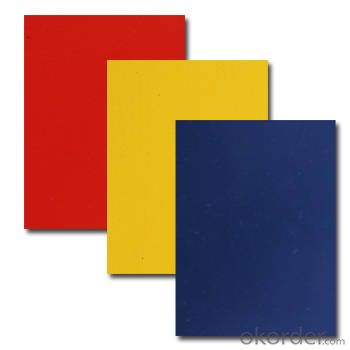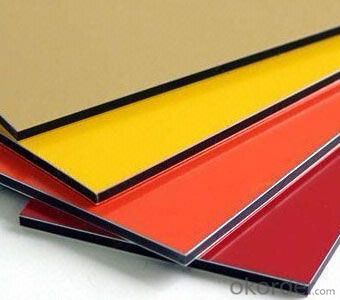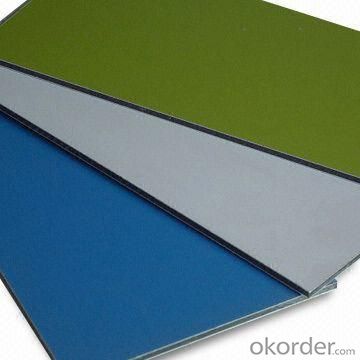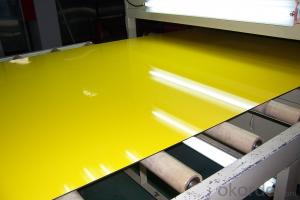EN AW - 4017 PVDF Prepainted Aluminium Composite Panel
- Loading Port:
- Shanghai
- Payment Terms:
- TT OR LC
- Min Order Qty:
- 5 m.t.
- Supply Capability:
- 1000 m.t./month
OKorder Service Pledge
OKorder Financial Service
You Might Also Like
Item specifice
1. Structure of EN AW - 4017 PVDF Prepainted Aluminium Composite Panel
EN AW - 4017 PVDF Prepainted Aluminium Composite Panel is one semi-finished aluminium material. This coil can be rolled down to aluminium coil,sheet,circle ect. The alloy AA1050 is widly used in building, industry ect. Its weight is much lower than steel. So many customers choosed aluminium material instead of steel.
2. Specification of EN AW - 4017 PVDF Prepainted Aluminium Composite Panel
EN AW - 4017 PVDF Prepainted Aluminium Composite Panel | |
Main Specification | |
Alloy | AA1xxx (AA1050, AA1060, AA1070, AA1100 etc.) |
AA3xxx (AA3003, AA3004, AA3005, AA3105 etc.) | |
AA5xxx, AA6XXX (AA5052,AA5083, AA5754, AA6061, AA6062 etc.) | |
AA8xxx(AA8011, AA8006 etc.) | |
Temper | H14,H16, H18, H22, H24, H26, H32,O/F, T4, T6, T651 |
Thickmess | 0.01mm-100mm |
Width | 30mm-1700mm |
Standard | GB/T 3880-2006/ASTM |
Special specification is available on customer's requirement | |
3. Application of EN AW - 4017 PVDF Prepainted Aluminium Composite Panel
(1).Interior: wall cladding, ceilings, bathrooms, kitchens and balconies, shutters, doors...
(2).Exterior: wall cladding, facades, roofing, canopies, tunnels,column covers , renovations...
(3).Advertisement: display platforms, signboards, fascia, shop fronts...
4. Feature of EN AW - 4017 PVDF Prepainted Aluminium Composite Panel
Surfact Quality :
Be free from Oil Stain, Dent, Inclusion, Scratches, Stain, Oxide Dicoloration, Breaks, Corrosion, Roll Marks, Dirt Streaks and other defect which will interfere with use,
Mechenical Property:
Chemical Composite and Mechanical Property
5. Certificate of EN AW - 4017 PVDF Prepainted Aluminium Composite Panel
SGS and ROHS(if client request, paid by client), MTC(plant provided), Certificate of Origin(FORM A, FORM E, CO), Bureau Veritas and SGS (if client request, paid by client), CIQS certificate
6. Image of EN AW - 4017 PVDF Prepainted Aluminium Composite Panel



7. Package and shipping of EN AW - 4017 PVDF Prepainted Aluminium Composite Panel
First, plastic cloth with drying agent inside; Second, Pearl Wool ; Third, wooden cases with dry agent , fumigation wooden pallets, aluminum surface could cover blue PVC film
8. FAQ
1) What is the delivery time?
Depends on actual order, around 20 to 35 days
2) What is the QC system:
We have QC staff of 20 persons and advanced equipment, each production is with MTC traced from Aluminum ingot lot.
3) What market do you mainly sell to?
Australia, America, Asia, Middle East, Western Europe, Africa etc
- Q:Can aluminum coils be used in the production of aluminum facades?
- Yes, aluminum coils can be used in the production of aluminum facades. Aluminum coils are commonly used as a raw material in the manufacturing process of aluminum facades. The coils are typically shaped, cut, and formed to create the desired design and dimensions of the facade. The use of aluminum coils provides durability, versatility, and ease of installation in the production of aluminum facades.
- Q:Can aluminum coils be used in the production of electrical cables?
- Aluminum coils are applicable for the production of electrical cables. Due to its exceptional electrical conductivity and lightweight properties, aluminum is widely utilized in the electrical industry. Power cables, building wires, and other electrical conductors are often manufactured using aluminum coils. They are considered a cost-effective alternative to copper coils, which are pricier but have higher electrical conductivity. By incorporating aluminum coils in electrical cables, the overall weight of the cables can be reduced, facilitating easier installation and handling. Furthermore, aluminum coils exhibit good resistance to corrosion, making them suitable for outdoor and underground applications. Nonetheless, it is crucial to acknowledge that aluminum possesses a lower tensile strength than copper. Hence, it is imperative to consider proper design and installation techniques to ensure the longevity and reliability of aluminum-based electrical cables.
- Q:How do aluminum coils impact energy efficiency?
- Aluminum coils have a significant impact on energy efficiency due to their excellent heat transfer properties. They are commonly used in air conditioning systems and heat pumps as they enhance the heat exchange process, allowing for faster and more efficient cooling or heating. The high thermal conductivity of aluminum ensures that the system operates effectively, reducing energy consumption and increasing overall efficiency.
- Q:How are aluminum coils used in packaging?
- Aluminum coils are commonly used in packaging as they can be easily molded into different shapes and sizes. They are used to create various packaging products such as cans, containers, and foils. The coils are converted into sheets or strips, which are then formed into the desired packaging structures through processes like rolling, cutting, and shaping. The lightweight and corrosion-resistant nature of aluminum make it an ideal choice for packaging applications, ensuring the protection and preservation of various products.
- Q:Can aluminum coils be used in high-humidity environments?
- Yes, aluminum coils can be used in high-humidity environments. Aluminum is a corrosion-resistant metal, and when properly protected with coatings or finishes, it can withstand high levels of humidity without rusting or deteriorating.
- Q:Are aluminum coils suitable for architectural louvers?
- Yes, aluminum coils are suitable for architectural louvers due to their lightweight nature, durability, and corrosion resistance. They can be easily shaped and formed into various louver designs, providing both functionality and aesthetic appeal to architectural structures.
- Q:How do aluminum coils contribute to sustainable construction?
- Due to their numerous environmental benefits, aluminum coils play a vital role in promoting sustainable construction practices. One key advantage is the high recyclability of aluminum, with almost 75% of all aluminum ever produced still in use today. This means that at the end of their lifespan, aluminum coils can be easily recycled, reducing the need for new raw materials and minimizing waste sent to landfills. Furthermore, compared to other materials like steel, the production process of aluminum coils requires significantly less energy. This results in a low carbon footprint, as the energy consumed during production is considerably lower, leading to fewer greenhouse gas emissions. Additionally, the reduced energy consumption contributes to lower operating costs for construction projects, making aluminum coils an economically viable choice. Moreover, aluminum coils are not only lightweight but also highly durable, making them an ideal option for sustainable construction. Their lightweight nature reduces the need for heavy support structures, which in turn reduces material consumption and transportation costs. Additionally, the durability of aluminum coils ensures a longer lifespan, reducing the frequency of replacement and minimizing waste generation. Another crucial aspect of aluminum coils in sustainable construction is their excellent corrosion resistance. This resistance means that structures made from aluminum coils require less maintenance and repair over time. Consequently, fewer resources are needed to uphold the building's integrity, resulting in a reduced overall environmental impact. In conclusion, aluminum coils contribute significantly to sustainable construction through their high recyclability, energy efficiency, lightweight yet durable nature, and excellent corrosion resistance. By opting for aluminum coils, construction projects can significantly decrease their environmental footprint, conserve resources, and advocate for a more sustainable built environment.
- Q:for purchasing aluminium are the grades to be mentioned
- If it is a product for work, yes engineers and purchasers specify the grades. If for hobby then it is up to you. Common extruded shapes (beams, tubes, angles) - 6061-T6 - 6063-T5 -T6 specifies tempering class. Actually both alloys come in various T4, T5, etc., the above are just two common combinations. 6061 is a little stronger, and T6 gets its strength up quite good. Beware that welded joints are weaker since heat removes the strength from tempering. Some common sheets - 6061 (strength) - 5052 (strength, welds better than 6xxx, good formability) - 5068 (some call it 'marine grade' for corrosion resistance) Sheets can come in many alloys.... you may get cheaper grades if you don't need one of these. (if you are casting - there's whole other system of grades.) The above are just common grades. For high strength requirement you may need a specific grade in the 7xxx family.
- Q:Pretty please can someone show me the steps on how to do this one?Calculate the mass in grams of iodine (I2) that will react completely with 43.7 g of aluminum (Al) to form aluminum iodide
- Aluminum Iodide is AlI3 - one aluminum atom bonded to three Iodine atoms. Look up the atomic weight of Aluminum. Look up the atomic weight of Iodine. Al / 43.7g =3 X Iodine / mass Mass of Iodine required = 43.7 X Atomic weight of Iodine X 3 / Atomic weight of Aluminum
- Q:Can aluminum coils be used in solar panel installations?
- Yes, aluminum coils can be used in solar panel installations. Aluminum is a popular choice for the construction of solar panels due to its lightweight nature, corrosion resistance, and excellent thermal conductivity. Aluminum coils are often used as the backing material for solar panels, providing structural support and heat dissipation. They are also commonly used in the manufacturing of solar mounting systems, which hold the panels securely in place. Overall, aluminum coils are a reliable and efficient option for solar panel installations.
1. Manufacturer Overview |
|
|---|---|
| Location | |
| Year Established | |
| Annual Output Value | |
| Main Markets | |
| Company Certifications | |
2. Manufacturer Certificates |
|
|---|---|
| a) Certification Name | |
| Range | |
| Reference | |
| Validity Period | |
3. Manufacturer Capability |
|
|---|---|
| a)Trade Capacity | |
| Nearest Port | |
| Export Percentage | |
| No.of Employees in Trade Department | |
| Language Spoken: | |
| b)Factory Information | |
| Factory Size: | |
| No. of Production Lines | |
| Contract Manufacturing | |
| Product Price Range | |
Send your message to us
EN AW - 4017 PVDF Prepainted Aluminium Composite Panel
- Loading Port:
- Shanghai
- Payment Terms:
- TT OR LC
- Min Order Qty:
- 5 m.t.
- Supply Capability:
- 1000 m.t./month
OKorder Service Pledge
OKorder Financial Service
Similar products
New products
Hot products
Related keywords






























